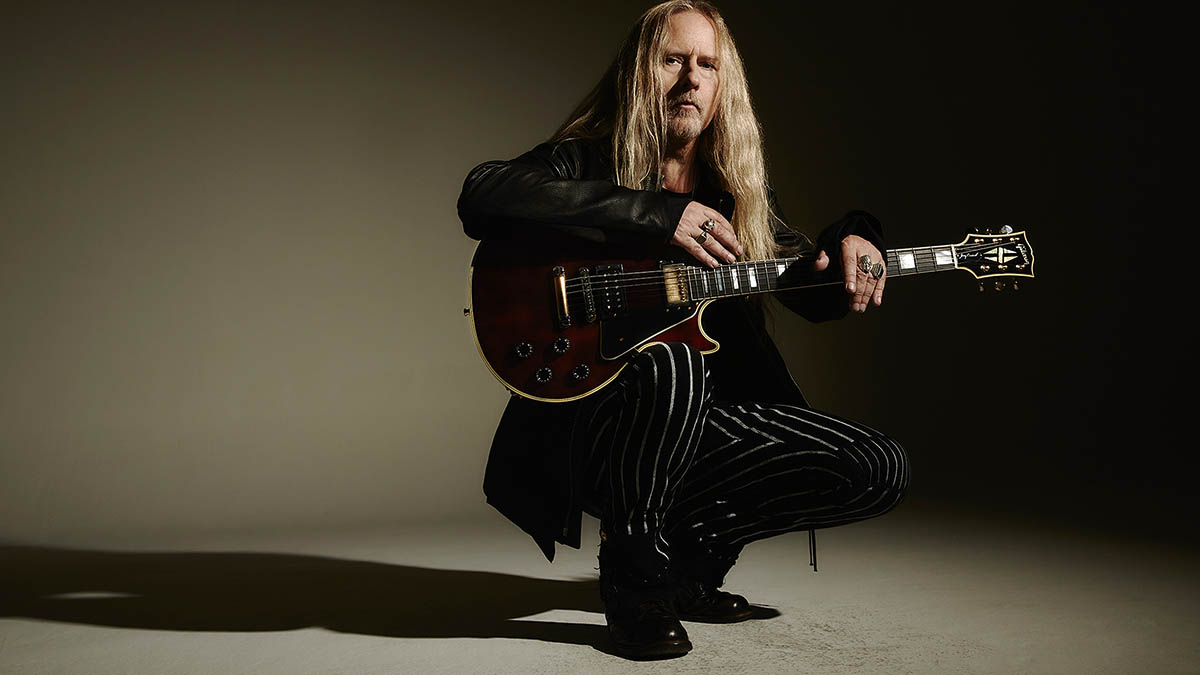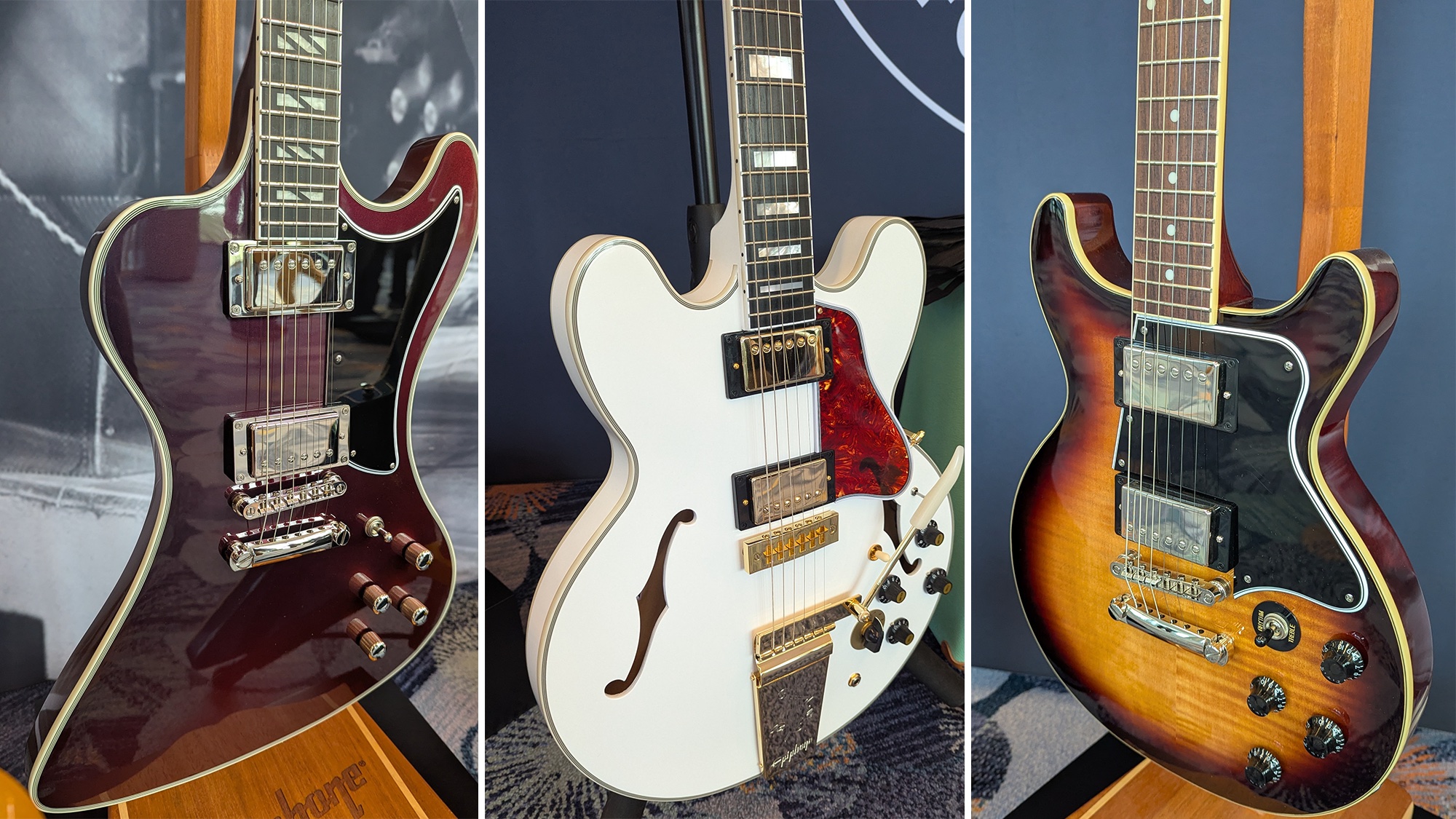Jerry Cantrell: “I’m a guitar player who loves kickass riffs. I grew up on them, so I knew to write something, you’d need the riff...”
The Alice In Chains guitarist is a master of the art who believes a great song requires only three key elements: “The riff. The melody. And something to say”

Jerry Cantrell has a way with chords. The Alice In Chains guitarist can take even the simplest of ideas and supercharge them with an emotional pull that sucks the listener right into the deep end of whatever mood he’s trying to convey.
From the Seattle group’s original run in the '90s, through his own solo endeavours and since the band’s rebirth in 2005, Cantrell’s mastery has made him one of rock’s true visionaries – a writer and player who makes you hear, feel and believe every word and note.
On his new solo album, Brighten, he’s embracing country music, yet still using the same electric guitar he’s used since Alice In Chains’ debut Facelift – an album that did so much to shape the sound of alternative rock in 1990. His motto: “Do what’s right for you.”
Which artists have influenced you most in terms of songwriting?
“It’s hard to narrow down because I’m just a fan of songwriting in general. I probably got turned onto the idea of it by listening to Elton John. That stuff felt really cool and I knew deep down I’d like to do something like that. I was also raised on country music, which is simplistic songwriting 101. They know how to get something across in a succinct manner.
“Pink Floyd were a big influence on me, the same goes for Led Zeppelin, Sabbath, The Beatles, Fleetwood Mac, the Eagles and many more. I think greatest acoustic writer of all-time has got to be Bob Dylan. Or Willie Nelson. Those two guys have been pretty epic and prolific.
“There are different components to it all, but I’m a guitar player who loves kickass riffs. I grew up on them, so I knew to write something you’d need the riff, the melody, and then something to say. Those are the main things. Then you need a great band to execute it, which is something I’ve been really fortunate with over the years...”
All the latest guitar news, interviews, lessons, reviews, deals and more, direct to your inbox!

So which of your guitars have you ended up writing most of your songs on?
“For electrics, it’s definitely my 1985 G&L ‘Blue Dress’ Rampage. Funnily enough, I’ve semi-retired that guitar. It’s up at a museum in Seattle right now. When we started making this record, and maybe even the last AIC album, I had to request them to send it back to me for the studio sessions.
“That guitar has been on every record I’ve ever made, in one form or another. I don’t know if there’s one single acoustic that I’ve written extensively on, that’s a bit more varied and changes depending on the era.
“For the few years preceding the Unplugged record [Alice In Chains’ MTV Unplugged, released in 1996], it was that Guild. There were other periods where I was really connected to a Martin. And over the last six or seven years, it’s mainly been Gibson Songwriters.”
Speaking of Songwriters, the acoustic you’re playing in the video for the new song Atone has certainly sparked a lot of speculation...
“Yeah, there might be something coming! I have to say, working with JC [James Curleigh, CEO] and Cesar [Gueikian, Brand President] from Gibson has been really good so far. Of course I have a long partnership with G&L, and I’m always going to play them.
“They’re a part of me, a part of my sound. On this album maybe I used more Gibsons and changed the equation a little bit, but I was excited about what they’re doing. It’s Gibson, for God’s sake! They’re so rock ’n’ roll.”
Atone feels more deeply rooted in country rock than anything you’ve recorded before – there’s that minor to major 3rd bend in the riff, for example.
“Yeah, there’s definitely a lot of that country feel in Atone. It’s a very rock and roll record, and you have to remember rock and roll spawned out of country and blues. It’s a mixture of the two. Even if you go back to the AIC EPs and early stuff, country was somewhere in there. It’s always been an ingredient in the mixing bowl.”
And it sounds like you’re using an open C# tuning (C#, G#, C#, F, G#, C#), which we’ve heard before on tracks like Over Now.
“That is absolutely correct. It’s the fourth track I’ve recorded with that particular tuning – there’s Over Now, Nothin’ Song, Hurt A Long Time and now Atone. There’s a hypnotic drone to it – I’ve always been a big fan of that. The tuning almost puts you in a trance, which is what I was going for with Atone, which ended up having an almost Western flavour to it.”
The way I record is very experimental. It’s like, ‘Okay, let’s try a Laney Klipp and a Flying V with a chorus pedal and a 25-watt Celestion cab!’ And we’ll just see what happens
Was it the Alice In Chains rig with you for the sessions, or did you end up trying something different?
“Some of it was the same. Friedman amps are the main rock sound. As always, there was a healthy dose of both Gibsons and G&Ls, and I was peppering in different guitars. Gibson sent over some really cool stuff, four guitars for the record to get some flavours I didn’t have.
“There was a Firebird, a cool old SG, a Goldtop Les Paul and this Trini Lopez guitar. The way I record is very experimental. It’s like, ‘Okay, let’s try a Laney Klipp and a Flying V with a chorus pedal and a 25-watt Celestion cab!’ And we’ll just see what happens.
“We’d bring every guitar, amp and pedal I own to the studio and also borrow what we didn’t have. Amp-wise, I know we used some AC30s, Soldanos, Marshalls, there was an Orange in there somewhere, and this really old Fender cab. And it was the same with acoustics – Gibsons, Martins, Guilds, a whole mix of stuff. We go by feel, and I really like that part of it.”
Do you carve out time for writing or does it usually happen on the fly?
“Yeah, it does just come sometimes, though it’s important to put in the necessary work, too. When I lock into a writing phase, I’m in! I know it will be a process of months, maybe a year, but once I’m locked in, I stay there until I’m done.
“Before that, though, I’m collecting. So whenever you are strumming through ideas and something catches your ear, you need to pick up the phone or use a tape recorder or whatever, record the riff and move on.
“By the time you get to the point where you are motivated to climb the mountain – because it is a big effort that won’t end until you are truly done – you want plenty of ideas to go into the process with.”
Going back to 1992 and the classic Alice In Chains song Down In A Hole – what do you remember about writing it?
“I couldn’t tell you exactly where or how I came up with it. But that particular tune felt pretty magical early on. Some songs just seem to rise above for some reason and that’s one of them.
“Songwriting is like trying to catch lightning in a bottle. The execution came out really well – Layne [Staley]’s vocals were sick, Sean [Kinney]’s drums were plodding and thunderous and Mike Starr’s bass playing is epic on that, too. You have to give a ton of credit to the group of fellas who elevated it and put themselves into it.
“I may have written it but it needed all of us to push into the place where it lives. In terms of songwriting, it’s certainly among my best and one of the ones I’m most proud of.”
On that song there’s no guitar solo as such, just some big harmonised bends at the beginning and a laid-back outro lead. You were clearly playing for the song, first and foremost.
“Sometimes you don’t need a ‘solo’ solo. There were a few songs on this new album that didn’t need one, either. Sometimes it’s better to make your guitar part of the fabric and sometimes you need to unzip the fly and whip it out. It just depends on what the song needs.”
On those first two Alice In Chains albums – Facelift and Dirt – you played a big part in popularising drop D-style riffing with songs such as We Die Young and Dam That River. When did you first start tuning down?
“I have to give Eddie Van Halen all the credit. I learned drop D because of Unchained. I just loved the sound of him on that, it was so heavy. As we were forming the band, I was already messing with tuning a half step down anyway. So when you drop that lower string further, it’s a note and a half from standard.
“And that adds a ton of thickness and sludge – it can make you way more brutal sounding for the heavier shit, like Dam That River, but even on the lighter stuff, too. It just adds this weight to everything. I don’t think we’ve ever recorded in regular pitch, to be honest.”
How much do scales and chord theory play a part in your songwriting process?
“I’ve got a little knowledge. I had a few lessons when I was starting out. I was able to read music well even before I started playing guitar, because I was in the choir. I couldn’t do it now.
“I left that behind and kinda wish I hadn’t, because it would make things a lot easier! I don’t know why – I guess sometimes it’s fun to turn the lights out. No guides, no grids, no vision. See what the fuck happens and dig your way out of that.
“I think about diving back into that stuff, but the other half of me says, ‘You’ve been doing pretty good so far, why fuck with it?!’ That’s all that matters... Do what’s right for you.”
My biggest advice would be don’t listen to what anyone else says... Ever
And what’s the biggest lesson you’ve learned along the way?
“My biggest advice would be don’t listen to what anyone else says... Ever. If it’s a producer or another songwriter or someone you respect, you can learn some shit from them, so don’t completely disregard stuff – information is a good thing – but personal experience is where music should come from.
“It’s gotta come from you. If it makes you feel, it will make somebody else feel. Believe in yourself and you can write your own Dirt or Brighten or whatever it is!”
- Brighten is out now.
Amit has been writing for titles like Total Guitar, MusicRadar and Guitar World for over a decade and counts Richie Kotzen, Guthrie Govan and Jeff Beck among his primary influences as a guitar player. He's worked for magazines like Kerrang!, Metal Hammer, Classic Rock, Prog, Record Collector, Planet Rock, Rhythm and Bass Player, as well as newspapers like Metro and The Independent, interviewing everyone from Ozzy Osbourne and Lemmy to Slash and Jimmy Page, and once even traded solos with a member of Slayer on a track released internationally. As a session guitarist, he's played alongside members of Judas Priest and Uriah Heep in London ensemble Metalworks, as well as handled lead guitars for legends like Glen Matlock (Sex Pistols, The Faces) and Stu Hamm (Steve Vai, Joe Satriani, G3).

